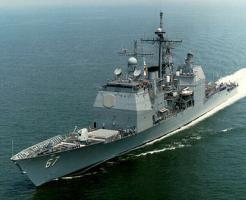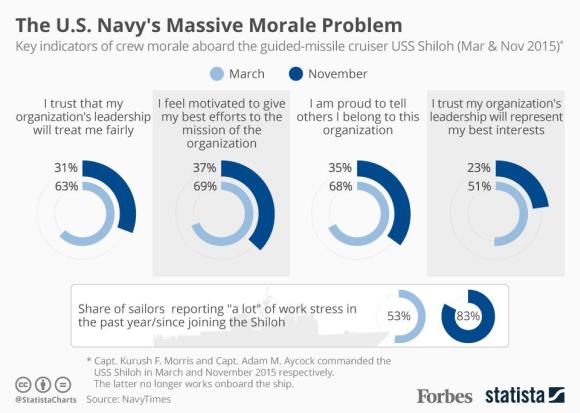 Back in June, we posted about a 50-hour, 5,500 square-mile man-overboard search across the Philippine Sea on the USS Shiloh. The search effort also included Japanese Coast Guard and naval forces. The sailor who was thought to have fallen overboard showed up after hiding in one of the ship’s engine room access trunks for a week. Recently, the Navy Times posted the result of an investigation into the incident, How Peter Mims spent a week hiding in a warship’s engine room.
Back in June, we posted about a 50-hour, 5,500 square-mile man-overboard search across the Philippine Sea on the USS Shiloh. The search effort also included Japanese Coast Guard and naval forces. The sailor who was thought to have fallen overboard showed up after hiding in one of the ship’s engine room access trunks for a week. Recently, the Navy Times posted the result of an investigation into the incident, How Peter Mims spent a week hiding in a warship’s engine room.
On first reading, the story appears to be that of a young possibly mentally disturbed young sailor who made a series of bizarre choices. Looking just slightly more in depth, it is also clear that much else was wrong aboard the Ticonderoga-class cruiser, which earned the nickname, USS “Bread and Water.”
There is no question that Gas Turbine Systems Technician 3rd Class Peter Mims was troubled. The 23-year-old sailor had personal and financial problems. He had sought mental health counseling but had not received much in the way of treatment.
Mims was odd. According to the Navy investigation, reported by the Navy Times, Mims told his shipmates that he could stop the ship’s engines pulsating electricity with his body, that he could shoot fireballs out of his hands, that he had a friend who had a motorcycle with the same engine as the ship, that he had been to space, and that before the Navy he was going to work for NASA because he had reached the pinnacle of how strong a human could be.” Reportedly, his shipmates believed that Mims sincerely believed his own outlandish statements.
Reportedly, Mims became increasingly paranoid and delusional before his disappearance, yet his superiors did little. The Navy investigation admonished the chain of command onboard USS Shiloh for failing to realize that Mims had serious mental health problems.
This shortcoming was not the only problem aboard USS Shiloh. Crew surveys obtained by the Navy Times depicted a crew suffering from overwork and depression. Under the then commander Captain Adam Aycock, morale had completely collapsed. One crew member was quoted as saying, “I just pray we never have to shoot down a missile from North Korea because then our ineffectiveness will really show.” Another said, “It feels like a race to see which will break down first, the ship or its crew.” Crew referred to their ship as a “floating prison.” Because of Captain Aycock’s propensity to punish minor infractions with confinement for three days in the brig while being fed only bread and water, the ship earned the nickname, USS “Bread and Water.”
After the recent series of collisions and accidents in the 7th fleet, which left 17 sailors dead and damaged four ships, the conditions aboard the USS Shiloh are very disturbing, particularly if they represent conditions in the fleet as a whole while operating a region where the stakes are extremely high. Is the 7th fleet up to the job?
Niall McCarthy, writing for Forbes comments: The surveys and the long list of recent incidents involving ships from the 7th fleet have raised serious concerns about its readiness and abilities to deter a North Korean missile attack. As tensions between Pyongyang and Washington continue to escalate, the U.S. military will have to act fast to shore up one of its most sophisticated and vital lines of defense.
Capt. Robert “Bo” Johns relieved Capt. Adam Aycock as the commanding officer of the USS Shiloh (CG 67) on August 30, 2017. Captain Aycock was sent to the U.S. Naval War College for his next tour.


That is a interesting slap on the wrist to Captain Adam Aycock. Alas his way to reprimand is the way he likely was brought up. It is doubtful he will unlearn this habit.